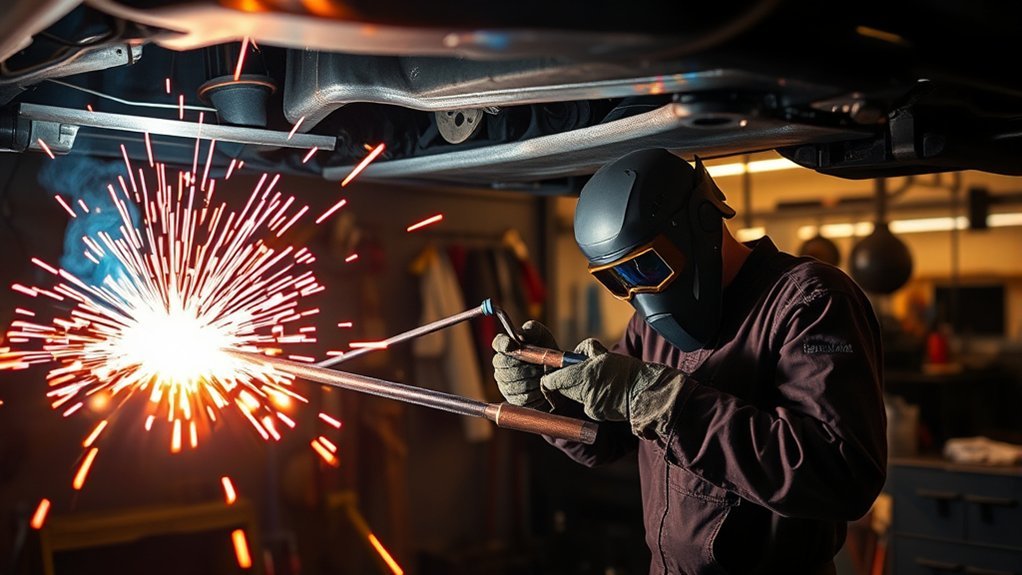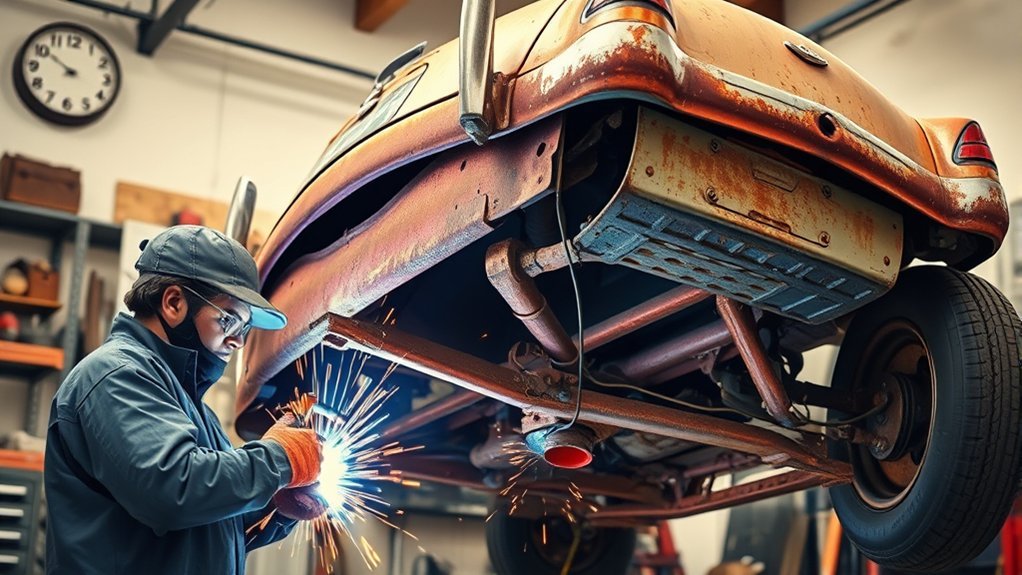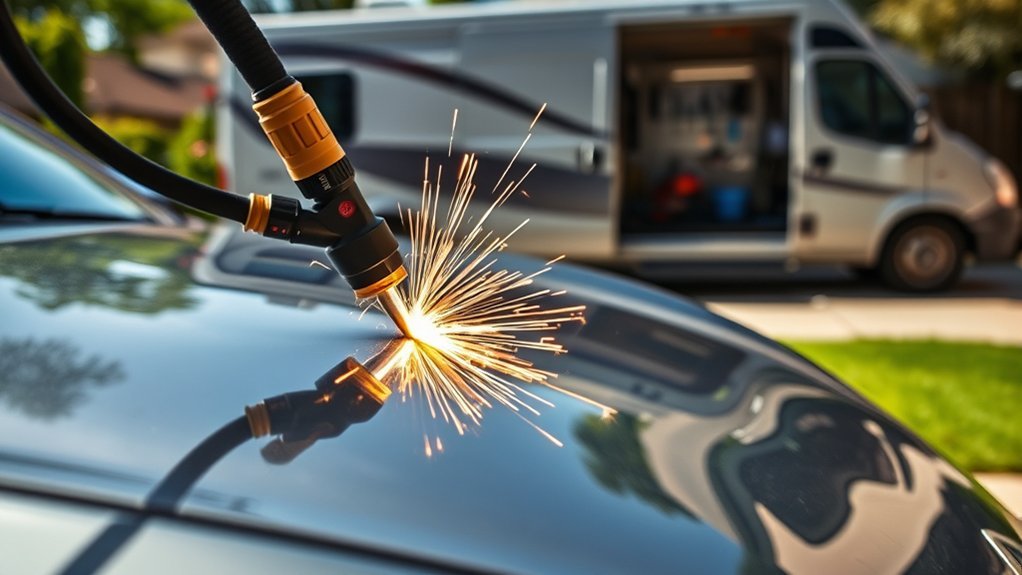Updated on 2026-02-28
Welding costs for car repairs in the UK usually start around £125 for small jobs and can reach about £1,000 for major work like chassis fixes. Mobile welders often add a call-out fee. This guide covers typical prices, how long jobs take, and what affects your quote.
As of February 2026, budget ~£125 for small rust patches, ~£300 for sill repairs, and up to ~£1,000 for extensive chassis work. Mobile welders usually charge £200–£300 for 2–3 hours. Total costs depend on repair complexity, access, materials, and welding method.
Key takeaways
- Small welding jobs usually start around £125; complex structural repairs can reach ~£1,000.
- Mobile call-outs generally cost £200–£300 for 2–3 hours, with higher rates for evenings or weekends.
- Costs vary by repair complexity, access, materials, and method (MIG vs TIG); always get an inspection first.
What Is Welding?

Welding is a key skill in car repairs. It joins metal parts by heating them to their melting point and fusing them under pressure for a strong bond.
Welding is crucial in automotive repairs, enabling strong bonds between metal pieces through heat and pressure.
In car work, the main methods are arc welding, MIG (metal-inert gas), and TIG (tungsten-inert gas). Each suits different jobs.
Welders often fix frames, fenders, and wheels, especially after MOT failures. Hire someone experienced to ensure the repair lasts.
Good welding includes rust removal and anti-corrosion treatment to make the fix last longer.
How Long Does Welding Take?

Small jobs like rust patches or holes usually take 1–2 hours. Complex work, such as chassis welding, takes longer.
The welding method and materials also play a role.
Access to the area matters too. For a proper estimate, talk to a welder who can see the car.
Mobile Welding Cost

As of February 2026, mobile services typically have a minimum call-out charge of £200 (covering 2–3 hours). Urgent jobs on evenings or weekends can cost around £300. Source: UK consumer price guide.
Mobile work is handy but usually pricier than garage jobs. Small repairs still start near £125, but the final price depends on the job and materials.
How Much Does Metal Welding Cost?
Car welding costs depend on the job size and difficulty.
Small fixes like holes or rust patches usually cost around £125. Chassis repairs can go up to about £1,000, depending on damage.
For small repairs, expect around £125; complex chassis work may rise to ~£1,000, depending on damage.
Mobile welding adds a £200–£300 call-out fee (usually 2–3 hours). Compare methods, location, and job details to get the best price.
What Affects the Cost to Weld Metal?
Repair Complexity
Bigger damage, structural importance, and needed techniques raise the price. Hidden rust discovered during inspection often increases the work and cost.
Location and Accessibility
Hard-to-reach spots take more time. Removing panels for rust fixes adds work. Sills, floorpans, and wheel arches each have different challenges.
| Welding location | Accessibility challenge | Estimated cost impact |
|---|---|---|
| Sills | Requires panel removal | +£100–£200 |
| Floorpans | Complex access | +£150–£250 |
| Wheel arches | Limited space | +£50–£150 |
| Engine compartment | High disassembly needed | +£200–£400 |
| Rear frame | Structural checks | +£100–£300 |
Type of Welding
MIG is often cheaper and faster to set up. TIG gives better precision but usually takes more time and costs more. Labour rates generally run £50–£150 per hour, depending on skill, area, and urgency. See UK price guide.
- MIG advantages: faster repairs and often lower labour costs.
- TIG is better for intricate work requiring high-quality finishes.
- Extensive rust repairs may exceed £400; small patches can start around £100.
For MOT-related structural areas, patch repairs generally must be continuously seam-welded to pass. DVSA MOT manual.
Things to Consider
Check the damage carefully—small rust can hide bigger problems. Match materials and method to the job. Think about whether mobile service is worth the extra cost. Add anti-corrosion treatment; it costs more upfront but protects the repair.
Key Takeaways on Welding
- Small repairs typically cost around £125; complex jobs can reach £1,000.
- Mobile services usually start with a £200 call-out fee.
- Prices depend on location, repair type, and access, so get an inspection first.
- Experienced welders use the right techniques and materials for lasting results and hidden damage fixes.
Common Areas Requiring Welding
Sills often rust out. Floorpans corrode over time. Wheel arches take damage from salt and road debris. Frame welding keeps the structure sound. Fenders may need fixes after crashes or metal fatigue.
Importance of Inspection Before Quoting
Assessing Rust Severity
Good rust checks show the exact spot and depth. Small visible patches can hide larger issues that change the cost and approach.
Evaluating Accessibility Issues
Inspections reveal tight spots and obstacles that add time. MOT failures versus routine maintenance also affect pricing.
| Accessibility factor | Impact on cost |
|---|---|
| Hard-to-reach areas | Increased labour required |
| Obstructions present | Additional repair logistics |
| MOT failure vs maintenance | Pricing variations |
Identifying Repair Type
A full inspection confirms the repair type, corrosion depth, access needs, urgency, and whether MOT areas need seam-welded patches.
FAQs
How much does car welding usually cost in the UK?
Small rust patches often cost around £125, sill repairs near £300, and complex chassis work up to about £1,000. Mobile call-outs typically run £200–£300 for 2–3 hours.
How long do typical welding repairs take?
Simple patches take 1–2 hours. Structural or hard-to-reach repairs take longer due to disassembly, prep, and seam-welding in MOT areas.
Will welding help my car pass its MOT?
Yes, proper welding can fix corrosion in structural areas and restore strength. Patch repairs in key areas usually need continuous seam welds to pass.
Are mobile welders more expensive than garages?
Yes, usually. They charge £200–£300 call-out for 2–3 hours, plus extras if the job runs longer.
Can I do welding repairs myself?
DIY is possible but risky. Bad welds can fail MOT and affect safety. For structural or MOT work, use a qualified welder.
Related articles
Conclusion
Knowing car welding costs in the UK helps you plan and budget. For a car with heavy rust, welding might cost £300 to £800 or more, depending on the work needed. Always start with a thorough inspection to catch hidden problems and avoid surprises.


